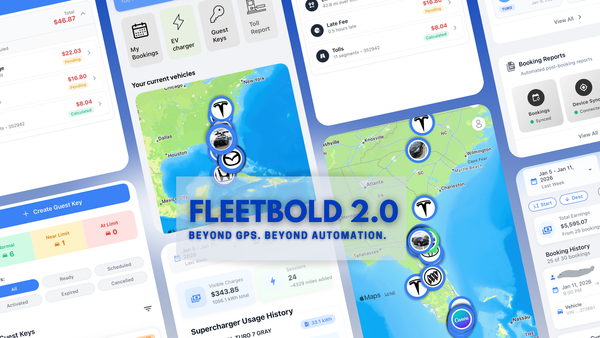Turo Layoffs 2025: A Strategic Move for Long‑Term Growth
In the wake of Turo’s recent workforce reduction, this post unpacks the reasons behind the decision, its impact on Hosts, and how leveraging tools like Fleetbold can help you thrive in today’s car‑sharing economy.

Introduction
Turo’s announcement of laying off approximately 150 employees in 2025 sent ripples through the car sharing community. While layoffs are never easy, it is vital to view this step as part of Turo’s broader strategy to navigate ongoing economic uncertainty and ensure the platform’s long‑term success. This blog post approaches the topic with empathy for those impacted and confidence in Turo’s ability to emerge stronger. We’ll explore Turo’s history, the context behind the workforce reduction, what it means for Hosts and users, and how third‑party tools like Fleetbold can help you maintain a thriving car sharing operation. Rather than criticizing Turo, our goal is to understand and support the company’s strategy, so Hosts can continue to deliver exceptional experiences.
Background on Turo
Turo began in 2009 with a simple mission: enable car owners to share unused vehicles and allow travelers to access diverse, affordable rentals. The company expanded rapidly from its original name to become one of the largest peer‑to‑peer car sharing platforms. Over the years, Turo has:
- Grown Its Community: Millions of hosts and guests now participate globally, reflecting strong adoption of the car sharing economy.
- Secured Funding: Major investors recognized Turo’s potential and provided significant capital, driving innovation and market expansion.
- Achieved Profitability: Unlike many tech startups, Turo reached positive earnings before interest, taxes, depreciation, and amortization, demonstrating a sustainable business model.
- Innovated Continuously: From introducing flexible pricing tools to expanding into electric vehicle rentals, Turo has prioritized functionality that benefits both hosts and guests.
This track record has established Turo as a trusted marketplace for car sharing. Hosts have built successful side businesses and full‑time operations by listing vehicles, earning income, and relying on Turo’s insurance and support infrastructure. Guests benefit from a wider selection of vehicles, often at lower costs than traditional rental agencies. The platform’s growth has paralleled the rise of the broader car sharing economy, as consumers seek convenient, tech‑driven solutions for mobility.
The Layoff News: What Happened and Why
In mid‑April 2025, Turo confirmed it would reduce its workforce by roughly 15 percent, affecting around 150 roles across various teams. Key facts include:
- Scope of Reduction: Approximately 150 employees out of nearly 1,000 total staff.
- Official Rationale: Turo cited ongoing economic uncertainty and the need to strengthen the organization for sustained growth.
- Timing: The decision followed Turo’s choice earlier in the year to postpone its initial public offering, reflecting a more cautious market environment.
- Employee Support: Leadership expressed gratitude for departing colleagues and committed to providing transition assistance, though specific severance details remain confidential.
It is important to emphasize that this layoff does not signal financial distress. On the contrary, Turo maintained that it continues to operate profitably and holds a strong balance sheet. By adjusting headcount now, the company aims to preserve capital, maintain runway, and focus resources on core initiatives that drive value for Hosts and guests alike. In a landscape where many tech companies face similar pressures, Turo’s move aligns with a broader trend of optimizing expenses and prioritizing long‑term stability over short‑term expansion.
Market Context: Tech & Mobility in an Uncertain Economy
Understanding the environment in which Turo made its decision helps clarify why a workforce reduction was deemed necessary:
- Tech Industry Downturn
In recent years, many technology companies have executed hiring freezes and layoffs. Investors demand clearer paths to profitability, and companies that over‑scaled during growth phases are now recalibrating. - Mobility Sector Pressures
Ride‑hailing firms and traditional rental agencies have also faced economic headwinds. Higher interest rates, inflation, and rising operating costs have prompted cost‑cutting measures industry‑wide. - IPO Market Freeze
Initial public offerings have slowed dramatically. Tech firms that hoped to go public in 2024 and early 2025 found market conditions unfavorable. Without the influx of IPO capital, privately held companies are tightening budgets. - Global Economic Uncertainty
Macroeconomic factors such as lingering inflation, geopolitical tensions, and fluctuating consumer spending create unpredictability. Businesses across sectors prefer leaner operations until clearer economic signals emerge.
Within this context, Turo’s decision reflects prudent management. By resizing its workforce, the company reduces burn rate, extends its financial runway, and maintains agility. This sets the stage for continued investment in technology, customer experience, and expansion once economic conditions stabilize.
What This Means for Turo Hosts and Users
When Turo hosts hear about layoffs, they naturally wonder about the impact on their day‑to‑day operations. Here is what Hosts and guests need to know:
- Core Services Remain Unchanged: The Turo app, website functionality, booking engine, insurance offerings, and core customer support channels continue to operate normally. There is no reduction in the platform’s marketplace capabilities.
- Commitment to Hosts: Turo reinforced its dedication to supporting Hosts. Communications from leadership emphasize ongoing investments in host tools, education, and community engagement.
- Platform Stability: By proactively managing costs, Turo aims to ensure it remains a stable and reliable partner for Hosts. A financially healthy company can focus on product improvements that benefit Hosts, such as improved pricing algorithms and demand insights.
- Guest Demand Persists: Travel demand remains strong in 2025, with guests seeking alternatives to traditional rental car companies. As economic pressures encourage cost‑conscious travelers, many prefer the flexibility and value found on Turo.
- Opportunity for Hosts: In uncertain times, travelers may look to peer‑to‑peer car sharing for better pricing. Hosts who maintain high‑quality vehicles and five‑star service are well positioned to capture this demand.
In short, the layoffs are a corporate measure that should not disrupt the services Hosts rely on. If anything, they position Turo to continue investing in features that drive bookings and deliver a seamless experience for both Hosts and guests.
Where Fleetbold Fits In for Turo Hosts
Running a successful Turo operation involves more than listing a car—it requires diligent fleet management, maintenance tracking, and real‑time visibility. Fleetbold is a powerful complement to Turo that can help Hosts maximize earnings and protect their assets:
- Real‑Time GPS Tracking: Always know where your vehicle is. Fleetbold provides live location updates so Hosts can monitor trips and ensure compliance with trip agreements.
- Smart Alerts & Notifications: Set geofence boundaries and receive instant alerts if a vehicle travels outside approved areas. Get maintenance reminders and diagnostics to address issues before they escalate.
- Driver Behavior Insights: Analyze speed, braking patterns, and idle time. Use this data to coach renters on proper care or to support damage claims with hard evidence.
- Remote Commands: For supported vehicles, remotely lock or unlock doors, improving convenience and security for both Hosts and guests.
- Centralized Dashboard: Manage one car or an entire fleet from a single interface. View trip history, upcoming bookings, vehicle health, and maintenance status at a glance.
By integrating Fleetbold into your Turo hosting workflow, you gain a professional edge. You reduce risk, minimize downtime, and leverage data‑driven insights to optimize your operations. As Turo sharpens its focus on efficiency, Hosts can mirror that strategy by using tools like Fleetbold to stay organized and profitable.
Positive Outlook: Turo’s Future and Opportunities Ahead
While the news of layoffs may feel unsettling, the long‑term outlook for Turo and its Hosts is bright:
- Proven Resilience: Turo has navigated major headwinds before, including regulatory challenges and the pandemic. Each time, the platform adapted and grew stronger.
- Strategic Vision: Turo leadership emphasizes sustainability and profitability. By delaying its IPO and optimizing expenses, the company prepares to seize growth opportunities when market conditions improve.
- Expanding Market: The car sharing economy continues to grow. Analysts forecast significant increases in peer‑to‑peer vehicle rentals as consumers seek flexible, cost‑effective mobility solutions.
- Innovation Pipeline: Expect continued enhancements such as dynamic pricing tools, improved host dashboards, and expanded support for electric vehicles. These innovations help Hosts boost earnings and guest satisfaction.
- Community Strength: Turo Hosts form a vibrant network of entrepreneurs. Shared best practices and peer support foster collective success. Leaner times often bring communities closer as they exchange tips and resources.
With its profitable track record, clear focus on efficiency, and growing global footprint, Turo is well positioned for the next phase of expansion. Hosts who adapt, stay engaged, and leverage smart tools will find new avenues for revenue and growth.
Conclusion
Turo’s decision to reduce its workforce by 15 percent in 2025 was a strategic move to align with economic realities and fortify the platform for long‑term success. While empathy for impacted employees is paramount, the broader context reveals a financially sound company focused on delivering value to Hosts and guests. Core services remain intact, demand for peer‑to‑peer car sharing endures, and Turo’s commitment to innovation continues.
For Hosts, now is the time to mirror Turo’s strategic focus. Maintain exceptional service, optimize your operations with tools like Fleetbold, and stay connected with the Turo community. By doing so, you will navigate the current environment successfully and position your car‑sharing venture for continued growth.
Change can be challenging, but it also brings opportunity. As Turo emerges leaner and more focused, Hosts have every reason to feel confident about the future of the car sharing economy. Together, we move forward driving innovation, embracing efficiency, and ensuring that the journey ahead is one of shared success.





